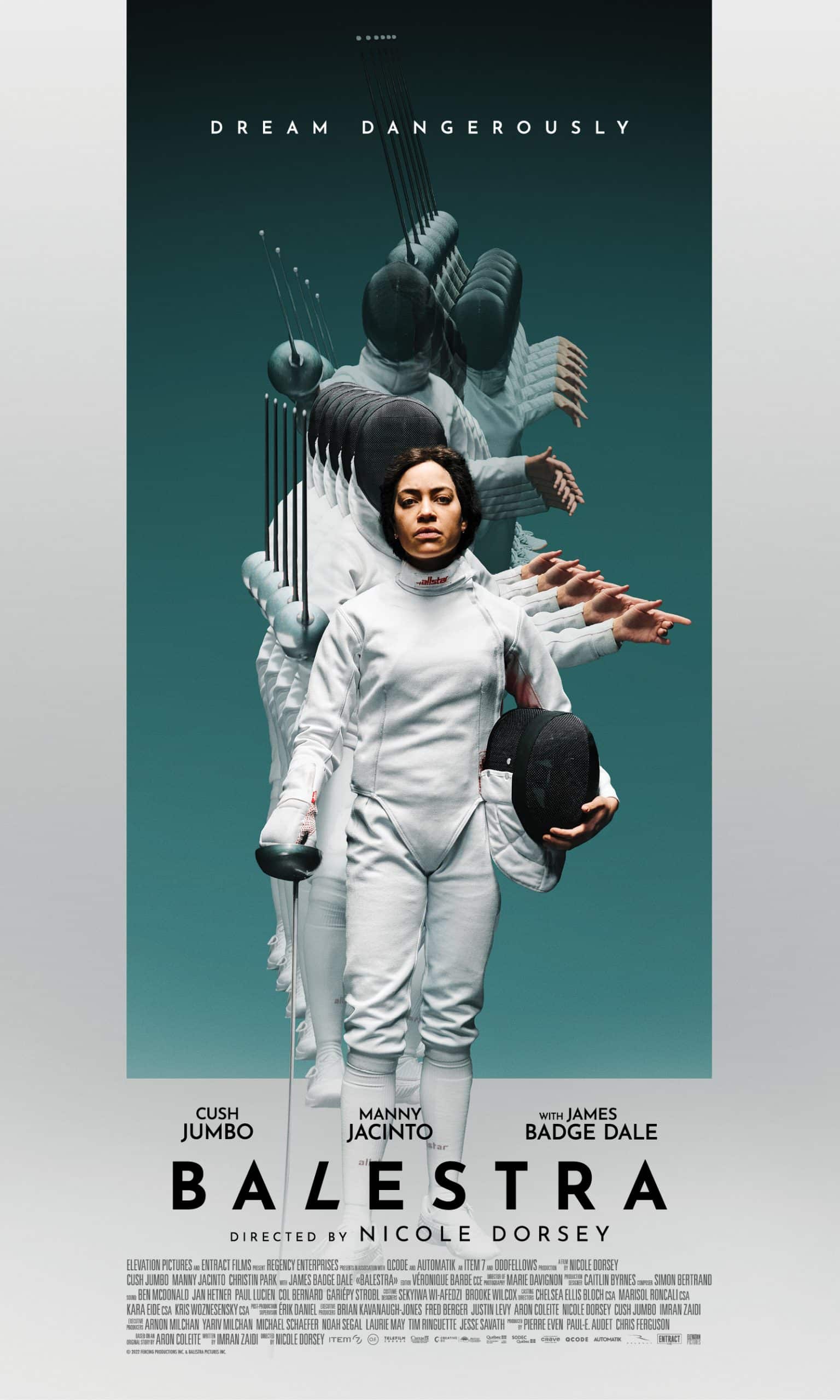
- Starring
- Cush Jumbo, Manny Jacinto, James Badge Dale,
- Writer
- Imran Zaidi
- Director
- Nicole Dorsey
- Rating
- 14A (Canada)
- Running Time
- 145 minutes
- Release Date
- August 9th, 2024
Overall Score
Rating Summary
Sports dramas usually narrate stories about ambition, pain, and sacrifice. In their development, the formulaic beats bring the overcoming of hardships, a tough loss, and the climax of competition. Balestra accepts this structure. It establishes Joanna (Jumbo), a thirty-four-year-old fencer trying to return to her elite-level fencing career. As she faces evidence of the ending of her career, those around her consider her to be an old-school athlete that younger women have outperformed, such as Zimmer (Christin Park), her arch-rival. As Joanna looked to qualify for the 2024 Paris Olympics, she must suffer from the over-expectations of her frustrated husband and coach, Raph (Dale).
However, the gimmick that Imran Zaidi’s script and Aron Eli Coleite’s story adds is the use of oneiric elements to the traditional sports film. It saw Joanna turn to a device named Halo so she could train in her dreams. It is an app that connects to an implanted chip in her ear, allowing her to train in her sleep. In this sense, Balestra plays with the possibilities of the fantastic. Through her training, the fencer develops a romance with her other dimension coach, Elliot (Jacinto). While the story shifts from the real to Joanna’s dreamy reality, the story immerses her in the cruel difference of relationships she must face. Raph has no loving feelings for her. There is no care or comfort for her. She is his opportunity to fulfill his dream of becoming a gold medallist. He considers his 2012 London Summer Olympics bronze medal a disgrace.
The dichotomy between both universes is interesting at times. Director Nicole Dorsey tries to visually paint the transitions within those mental states. The dreams are well-lightened sets, and the beach becomes a frequent background for Joanna and Elliot’s love. The training sites are confined and suffocating, while the battles have a darker color to them. However, the film is not as smooth as it tries to look. The script dynamic loses within itself and needs more cohesion to work thoroughly. Over the course of its 145-minute runtime, the film goes from a sports drama to a contemporary science fiction and a crime thriller. But as a whole, it does construct visually a unit. All of that makes for a film that feels like a couple of different films, as Dorsey’s aims for differentiation.
Within the core of Balestra was a fascinating film offering a unique story at least on paper, however, trying to emulate such films as Paprika and Inception only diminishes its ideas, resulting in a net of good ideas lost amongst a disjointed work overall. Jumbo delivers a decent performance, even though Joanna suffers from an inconstancy of tones. Some moments ask for a dramatic rhythm that she may not reach due to a lack of energy in the directing. Dorsey does not control where the film goes which hugely affects her cast. Jacinto, meanwhile, does not have enough material to interpret a lover who injects passion and chaos into Joanna’s life. His appearance and motivations are so thin that some may find him forgettable.
That being said, there are some of the choices that worked well. The score is functional. There is an intelligent sound work that separates the audio track. It brings a sensation of isolation the adrenaline provides. There are good ideas overall. However, Dorsey comes off as confused about the kind of film she wants to make, stuck between a sports drama, a cerebral sci-fi, or a criminal thriller. In the end, Balestra fails to reach a cohesive note and merely becomes a fencing film that refuses to attack its objectives.
still courtesy of Elevation Pictures
If you liked this, please read our other reviews here and don’t forget to follow us on Twitter or Instagram or like us on Facebook.
Brazilian film writer. He is also a producer and executive producer for Zariah Filmes. Member of the International Film Society Critics Association (IFSCA), International Documentary Association (IDA), and Gotham and Media Film Institute.
Discover more from
Subscribe to get the latest posts sent to your email.
